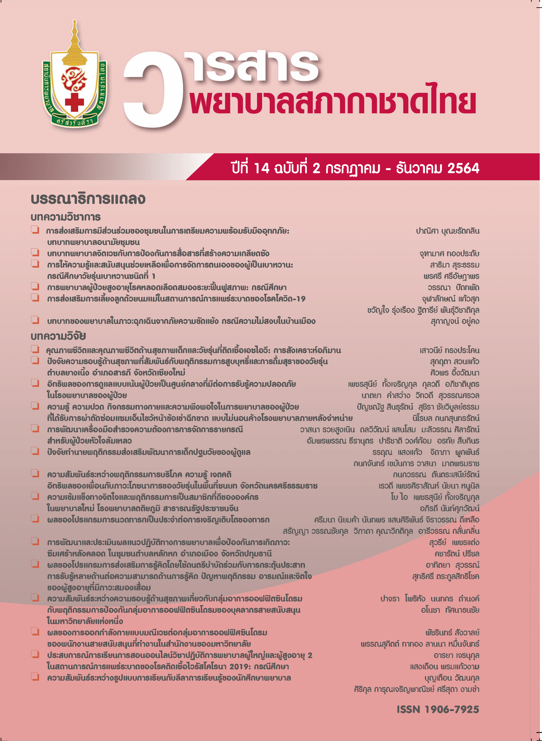Relationships between Knowledge, Attitude and Peer Influences, and Food Consumption Behaviour on Nutritional Status among Adolescents in a Rural Area of Nakhon Si Thammarat Province
Keywords:
food consumption behavior, nutrition status, adolescentsAbstract
This was a cross-sectional descriptive and correlational study aiming to study the relationships between food consumption knowledge, food consumption, attitudes, and peer influences in food consumption and food consumption behaviour on nutritional status among adolescents in a rural area of Nakhon Si Thammarat, Thailand. Data were collected through survey questionnaires from 130 volunteers, chosen by simple random selection, who were 13-18 years of the age. Data were collected using questionnaires covering a number of topics,e including food consumption knowledge, food consumption attitude, peer influences, and food consumption behaviour. Nutrition status was calculated by an online program of Department of Health, Ministry of Public Health using a nutritional index and BMI percentages. Descriptive statistics and Spearman rank correlation coefficient were used for data analyses.
Low positive correlations with nutrition status were found with food consumption knowledge ( rs=.277,p < .01), peer influences in food consumption (rs=.277,p < .01), and food consumption behaviour (rs=.172, p < .01). Moreover, food consumption attitude was found to be uncorrelated with nutritional status ( rs=.004, p > .05)
Results of this study should be used in developing nutritional information about food consumption behaviour affected by peer interaction, and information about food consumption for promoting nutritional knowledge appropriate for adolescents.
References
World Health Organization. Guideline: implementating effective actions for improving adolescents nutrition [Internet]. 2018 [cited 2019 Jan 2]. Available from: https://apps.who.int/iris/bitstream/handle/10665/260297/9789241513708-eng.pdf?sequence=1&isAllowed=y
Aekphalakorn W. Report of the 5th Thai health survey by physical exam 2014 [Internet]. 2018 [cited 2019 Jan 19]. Available from: https://kb.hsri.or.th/dspace/bitstream/hadle/11228/4604/uc_vichai.pdf. (in Thai)
World Health Organization. Adolescents: health risks and solutions [Internet]. 2018 [cited 2020 Jun 1]. Available from: https://www.who.int/news-room/fact-sheets/detail/adolescents-health-risks-and-solutions.
Department of Health. Correct eating habit [Internet]. 2010 [cited 2019 Jan 12]. Avaiable from: https://www.anamai.moph.go.th.
Ruangying J, Jorjit S, Janyam K. Food consumption behavior of adolescents in Songkhla Province: synthesis of literacy and factors influencing food consumption behavior. Journal of Liberal Arts, Prince of Songkla University, Hat Yai Campus 2016;8(1):245-64. (in Thai)
National Statistical Office. The 2017 food consumption behavior survey [Internet]. 2018 [cited in 2019 Jan 10]. Available from: http://www.nso.go.th/sites/2014en/the-2013-food-consumtion-behaviour-survey. (in Thai)
Piaseu N, Tatsanachantatanee D, Kittipoom S, Putwattana P. Nutritional knowledge, attitude toward food, food Behavior, and nutritional status among nursing Students. Rama Nurs J 2010;15(1):48-59. (in Thai)
Bunnag A, Sangperm P, Jungsomjatepaisa W, Pongsaranunthakul Y, Leelahakul V, Wattanakitkrileart D. The Relationships between food consumption, exercise and nutritional status of adolescents in Bangkok Noi District. J Nurs Sci 2010;28(3):30-9. (in Thai)
Gibbs H, Chapman-Novakofski K. A review of health literacy and its relationship to nutrition education. AJCN 2012;27:325-33.
Department of Family Medicine and Primary Care Services. Annual report 2015. Nakorn Si Thammarat: Thung Yai Hosipital; 2015. (in Thai).
Bandura A. Self-efficacy: toward a unifying theory of behavioral change. Psychol Rev 1977;84(2):191-215.
Bureau of Nutrition. Food consumption behavior [Internet]. 2016 [cited 2019 Jan 10]. Available from: https://nutrition2.anamai.moph.go.th/th/book
Bloom BS. Learning for mastery: Instruction and curriculum. Regional education laboratory for the carolinas and virginia, topical papers and reprints, number 1. Evaluation Comment 1968:1(2):1-12.
DokkhemS. The food consumption of junior high school students in Bangkok [Thesis]. Bangkok: National Institute of Development Administration; 2011. (in Thai)
Kaewprom S. Food consumption behavior in accordance with the National Health Recommendations of Prathom Suksa 6 Students in Amphur Thasala Changwat Nakhon Si Thammarat Province [Thesis]. Bangkok: Srinakharinwirot University; 2006. (in Thai)
Institute of Nutrition, Mahidol University. INMU-ThaiGrowth [Internet]. 2010 [cited 2019 Jan 10]. Available from: http://www.inmu.mahidol.ac.th (in Thai)
Chaingkuntod S. Knowledge, attitude, consumers’s behavior and the media influence on consumer behaviroe of Phasicharoen Persons [Internet]. 2013 [cited 2020 Oct 22]. Available from: https://pubhtml5.com/nxxo/ixxv. (in Thai)
Chuntum K, Sattayarak P, Kamlangluea K. Food consumption behaviors and nutritional status of school age children in Na Fai Sub-District, Mueang District, Chaiyaphum Province. Journal of Nursing and Health Sciences 2019;12(4):50-60. (in Thai)
Yimprasert S. Food consumption behavior of undergraduate student level 1 in Rajamangala University of Technology Isan Nakhon Ratchasima. Ratchaphruek Journal 2017;15(1):33-41. (in Thai)
Downloads
Published
Issue
Section
License

This work is licensed under a Creative Commons Attribution-NonCommercial-NoDerivatives 4.0 International License.
เนื้อหาบทความหรือข้อคิดเห็นต่างๆ ในวารสารพยาบาลสภากาชาดไทยนี้ เป็นความคิดเห็นของผู้เขียนบทความ ไม่ใช่ความเห็นของกองบรรณาธิการ หรือสถาบันการพยาบาลศรีสวรินทิรา สภากาชาดไทย






